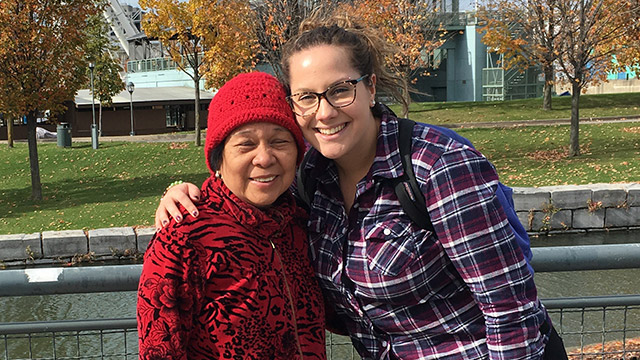
Caring for a person living with dementia is not always easy
Being a caregiver means facing physical and emotional challenges every day. Caregivers often fail to detect the warning signs of stress and the impact of their role on their health. They prioritize the well-being of those they care of— at the expense of their own needs— even though they are often the ones who need the most support. This is why the Alzheimer Society of Montreal offers a range of services for caregivers: to provide them with the support they need and show them how to look after themselves.
Am I Eligible to Receive Caregiving Benefits?
At the Alzheimer Society of Montreal, we know that caregivers invest a lot of time and energy into caring for their loved ones living with Alzheimer’s disease or a related form of dementia. But did you know that caregivers are also entitled receive support? You could be eligible to receive respite services, tax credits, and caregiving benefits from the government.
Services for Caregivers
Individual Consultations: Counselling-Network
Helping someone with dementia can be challenging on a number of levels.
Know that our counsellors are available to provide free and confidential counselling, information, support, and resources that are adapted to your situation.
To discuss your situation and make an appointment: 514 369-0800
Information and Support Groups
These groups are for family and friends of people living with Alzheimer’s disease or a related form of dementia, long-distance caregivers included.
Our information and support groups cover a variety of topics, including: an overview of Alzheimer’s disease and related forms of dementia, various aspects of communication, understanding responsive behaviours, taking care of yourself as a caregiver, and the different community resources available in your area.
For more information and to register: 514 369-0800
Activity Centres
The objective of our activity centres is to provide caregivers and families with a few hours of respite on Saturdays, while also offering stimulating activities to their participants living with dementia.
The Alzheimer Society of Montreal currently operates in three activity centres located in Ahuntsic, Lachine, and Westmount. Each centre employs qualified staff and volunteers who possess the knowledge and experience to meet the individual needs of participants and reassure family members.
For more information and to register: 514 369-0800
In-Home Respite and Stimulation Program
Our qualified professionals provide caregivers with a planned period of respite, varying from 2 to 4 hours per week.
This service provides stimulating, therapeutic, and socially engaging experiences to its participants living with dementia in a reassuring setting.
For more information and to register: 514 369-0800
The Stages of Alzheimer’s Disease
Alzheimer’s disease and related forms of dementia are progressive and lead to the degeneration of brain cells. In general, the disease progresses slowly, however, the speed of its progression varies from person to person. The following is is an overview of each stage of the disease to help you better prepare for the journey ahead. Please note that symptoms may not appear in the order summarized below, and that the duration of each stage is, in itself, variable.
Early Stage
Middle Stage
Many everyday tasks— e.g. shopping, dressing, bathing, etc.— require more and more assistance. At this stage, some people with dementia retain a level of awareness of their condition and caregivers help them maintain their autonomy by focusing their efforts on preserving their current abilities.
Late Stage
At this stage, full-time care may be required to ensure optimal quality of life for the person living with the disease.
End of Life
At this stage, the care provided aims to fulfil the physical, spiritual, and emotional needs of the person with dementia, whose cognitive and physical capacities will be greatly reduced.

Making an Appointment with a Doctor
A doctor’s appointment can be an intimidating experience for a person who may be living with dementia, as well as for their friends and family. There are, however, a number of actions you can take before and after the appointment to alleviate any potential problems. e.g. Make an appointment at a time convenient both for you and the person who may have dementia, rest beforehand; etc.
Decision-Making
The progressive nature of Alzheimer’s disease and related forms of dementia means that the decision-making abilities of the person living with the disease may change over time. As a caregiver, you can help the person you care for to make decisions that reflect their wishes and their needs.
Caring for the Caregiver
Caring for a person living with dementia can be very rewarding; you will likely share some wonderful moments with the person you care for. There will also be times, however, when you feel discouraged, lost, and both physically and mentally drained. This is why caregivers need to learn to look after themselves. If you do not look after yourself, you cannot care for someone else.
Loss and Grief
It is normal for caregivers to experience a sense of loss, especially at the more advanced stages of the disease, e.g. when the person living with dementia no longer recognizes them or can no longer speak. It is likely that people living with dementia also grieve as they notice the gradual decline in their abilities. The loss and grief experienced by caregivers of people living with dementia is unique, because it cannot be fully resolved while the person living with the disease is still alive.




Testimonial from a Caregiver!
“My advice to caregivers is simple: don’t go through this alone, contact the Alzheimer Society of Montreal! You will be listened to, helped, comforted, and entertained! You will laugh, maybe cry,and have fun with your loved one, probably more than ever. You will see him or her smile, be proud, and be thankful. You will never regret the day you had to find a solution to your continuous stress and worries and decided to call!”